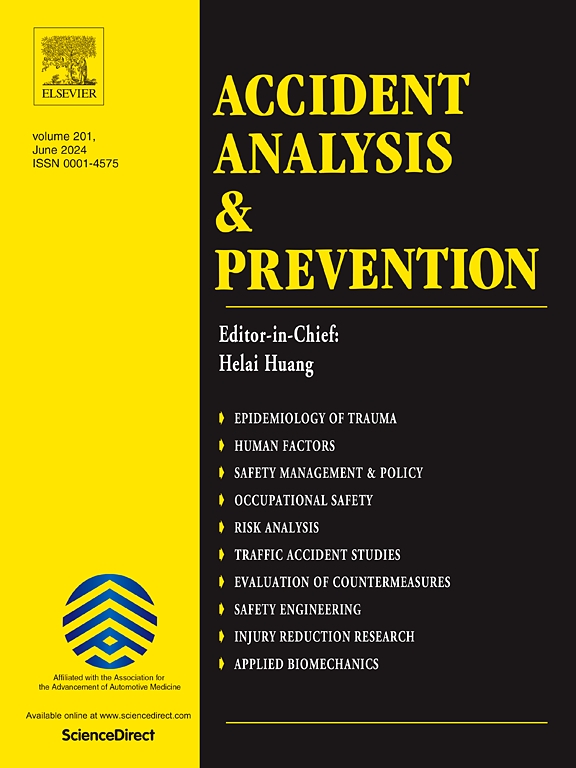评估针对成年人的在线骑行培训在掌握复杂交通状况方面的效果。
IF 6.2
1区 工程技术
Q1 ERGONOMICS
引用次数: 0
摘要
背景:认识到主客观安全对促进骑自行车的重要性,有必要采取有效措施,提高更广泛人群的骑自行车技能。因此,本研究的目的是评估和调查针对成人的在线自行车训练的影响。方法:开发了一个由三个模块组成的在线自行车训练,以在七个典型的安全相关情况下训练安全行为。1万人被邀请参加,其中700人完成了培训。培训的有效性通过结合自我报告测量和行为测量的混合方法进行评估。自我报告测量采用自行车技能量表的四个项目和基于知识的问题收集。在行为层面上,使用虚拟现实循环模拟器调查有效性。结果:对参与在线培训前后参与者自述的骑行技能进行评估。平均而言,四分之三的自我报告技能(即预测交通状况,表现出考虑,知道如何行动)在所有参与者中都有所提高。此外,骑车频率较低的参与者从培训中受益更多,因为他们在完成在线培训后表明了他们识别危险、预测交通状况和知道如何适当行驶的能力。最后,所有参与者都表示,在完成训练后,他们在骑自行车时感觉更舒服了。在培训评估中发现,在行为层面上,治疗组在交通中更安全,并/或在五分之三的评估情况下拥有所需的知识技能。结论:这些有希望的发现表明,在线自行车训练是在成年自行车手的目标受众中发展自行车技能的一种潜在途径:不仅在知识水平上,而且在行为水平上。尽管有局限性,我们的结论是,在线自行车训练可以有助于更安全的骑自行车和促进骑自行车。本文章由计算机程序翻译,如有差异,请以英文原文为准。
Assessing the effectiveness of an online cycling training for adults to master complex traffic situations
Background:
Acknowledging the significance of both subjective and objective safety in promoting cycling, there is a need for effective measures aimed at improving cycling skills among a broader population. Hence, the aim of the current study is to evaluate and investigate the impact of online cycling training targeted at adults.
Methods:
An online cycling training consisting of three modules was developed to train safe behaviour in seven prototypical safety-relevant situations. 10,000 individuals were invited to participate, with 700 individuals completing the training. The effectiveness of the training was evaluated using a mixed-methods approach combining self-report measures with behavioural measures. Self-report measures were collected using four items of the Cycling Skills Inventory and knowledge-based questions. On a behavioural level, effectiveness was investigated using a virtual reality cycling simulator.
Results:
Participants’ self-reported cycling skills were evaluated before and after participation in the online training. Three out of four self-reported skills (i.e. predicting traffic situations, showing consideration, knowing how to act) improved on average, across participants. Moreover, participants who cycle less frequently benefited more from the training as they indicated their ability to recognise hazards, to predict traffic situations and to know how to appropriately after completion of the online training. Finally, all participants indicated that they felt more comfortable while cycling after completing the training.
In the training evaluation, it was found that the treatment group navigated through traffic more safely on a behavioural level, and/or possessed the required knowledge-based skills in three out of five evaluated situations.
Conclusion:
These promising findings indicate that online cycling training is one potential avenue to develop cycling skills within a target audience of adult cyclists: not only on a knowledge level, but also on a behavioural level. Notwithstanding limitations, we conclude that an online cycling training can contribute to safer cycling and the promotion of cycling in general.
求助全文
通过发布文献求助,成功后即可免费获取论文全文。
去求助
来源期刊

Accident; analysis and prevention
Multiple-
CiteScore
11.90
自引率
16.90%
发文量
264
审稿时长
48 days
期刊介绍:
Accident Analysis & Prevention provides wide coverage of the general areas relating to accidental injury and damage, including the pre-injury and immediate post-injury phases. Published papers deal with medical, legal, economic, educational, behavioral, theoretical or empirical aspects of transportation accidents, as well as with accidents at other sites. Selected topics within the scope of the Journal may include: studies of human, environmental and vehicular factors influencing the occurrence, type and severity of accidents and injury; the design, implementation and evaluation of countermeasures; biomechanics of impact and human tolerance limits to injury; modelling and statistical analysis of accident data; policy, planning and decision-making in safety.
 求助内容:
求助内容: 应助结果提醒方式:
应助结果提醒方式:


